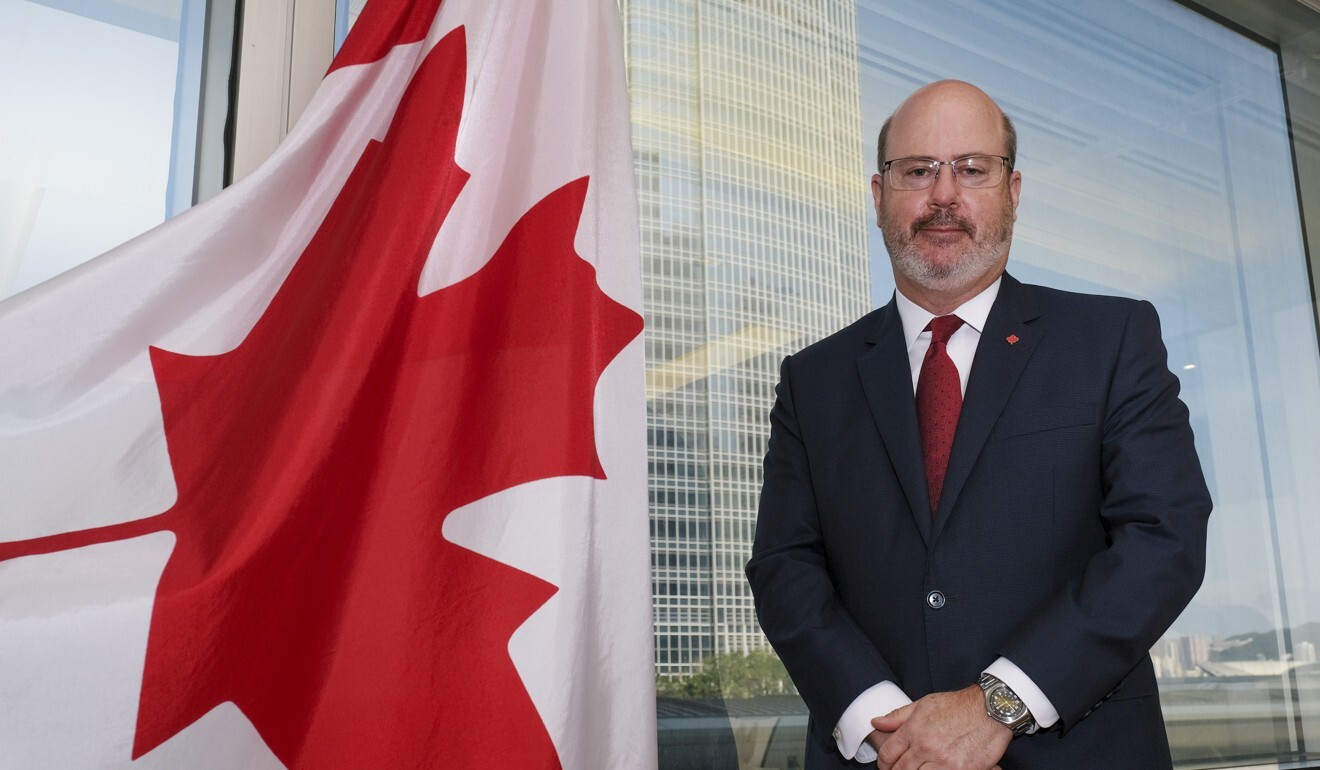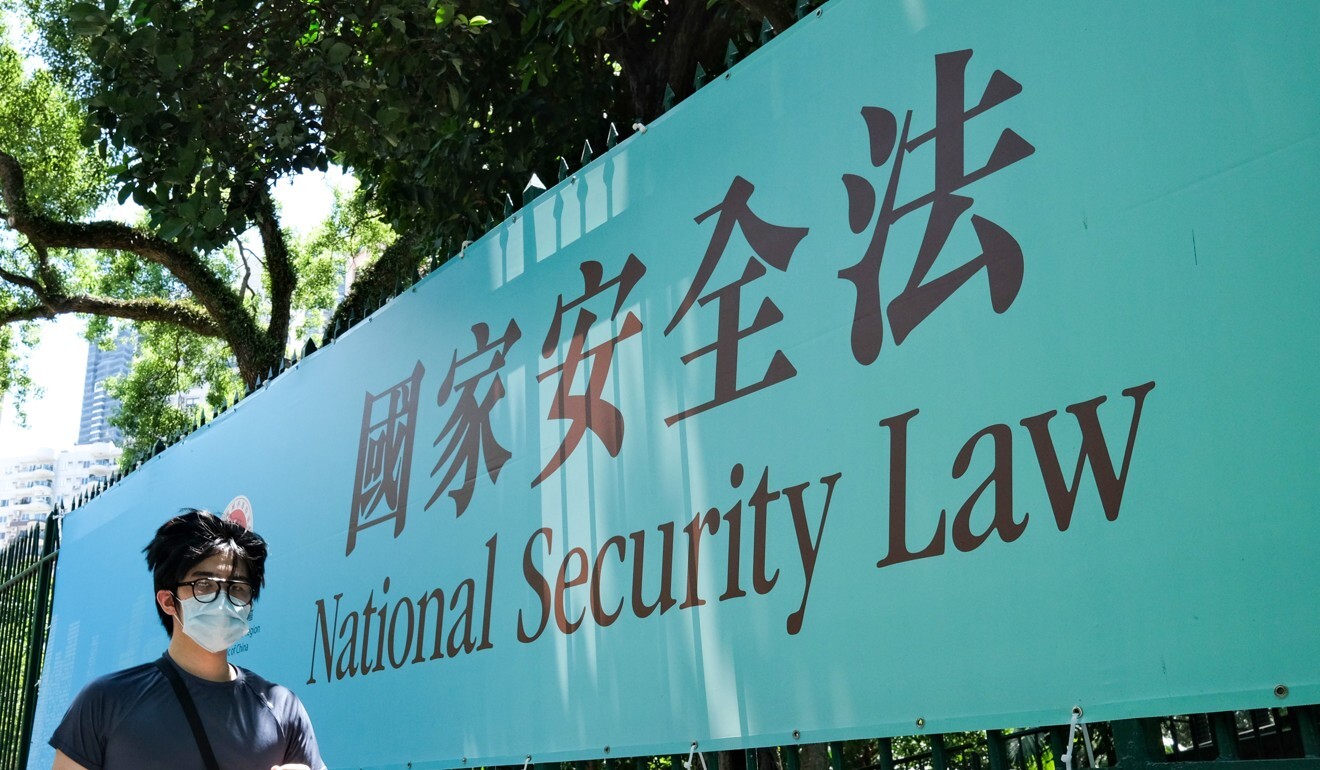
Canadian diplomat does not expect China fallout over ‘blanket’ permit to welcome Hong Kong migrants
- Easier now for graduates, diploma holders to work in Canada before seeking permanent residency
- ‘Unfair’ for Hong Kong to ask prisoners with dual nationality to choose one, diplomat says
Canada does not expect China to retaliate over its new work permit programme aimed at attracting talented young Hongkongers, launched in response to the national security law imposed by Beijing, its top diplomat in the city said.
Jeff Nankivell, Canada’s consul general in Hong Kong, said the scheme had drawn a “steady stream” of applicants since it began on February 8, although he was unable to provide numbers.
In an interview, he also accused Hong Kong authorities of failing to deliver “administrative fairness and natural justice” by denying prisoners with dual Canadian-Chinese nationality access to legal and consular advice until they declare a single nationality.
Canada has stood with the United States, Britain, Australia and New Zealand in slamming the national security law imposed by Beijing on Hong Kong last June. The law bans acts of secession, subversion, terrorism and interference by foreign forces in the city’s affairs.

Amid strained relations with Beijing, Ottawa launched a three-year work permit programme this month and will provide details of two more immigration schemes later this year.
“These are positive measures to build on programmes that Canada already has for people from around the world,” Nankivell said. “Because it’s not directed against anybody, we don’t anticipate there should be any kind of retaliation.”
From this month, Hong Kong residents who have graduated from a recognised diploma or degree course in the past five years can apply to work in Canada for three years. Their qualifications need not be from Canada.
Canada’s ‘huge’ immigration offer to Hongkongers amid political turmoil
A second measure expected later this year will help Hongkongers with at least a year’s work experience in Canada to settle there. A third measure will allow Hongkongers who have graduated from a postsecondary institution in Canada to apply directly for permanent residency.
Nankivell said the new “blanket” permit allows successful applicants to take on all kinds of jobs anywhere in the country, and their spouses and children can go with them.
Canada’s federal system means that individual provinces will decide whether successful applicants and their children pay local or international health care and education fees, he added.
This is different from Britain’s new BN(O) visa programme, which offers Hongkongers access to public education and health care, with a surcharge of £3,120 (US$4,400) for five years for those aged 18 or above.
Canada’s new scheme allows successful applicants to apply for permanent residency after working full-time for a year. Once granted that status, they may apply for citizenship after living in the country for three out of five consecutive years.
Nankivell said he could not provide exact figures of applicants for the new programme, as applications were being handled centrally in Canada along with other immigration schemes.
Last year, as the Covid-19 pandemic disrupted global travel, 1,045 people from Hong Kong were admitted as Canadian permanent residents, down from 1,540 in 2019. Canada accepted 16,550 mainland Chinese last year, down from 30,245 the year before.
‘Prisoners denied access to help’
On dual nationality, Nankivell said that under an agreement between Canada and China, effective since 1999 and applicable to Hong Kong, dual citizens are entitled to Canadian consular access if they enter Chinese territories with their Canadian passport.
“It’s not a recognition of their nationality. It is an agreement that they will be treated as Canadian for consular purposes,” he said.

Last month, Hong Kong’s prison authorities started asking prisoners with dual nationality to pick one, with no reasons given to the Canadian consulate. The US and British governments have also expressed concerns on the issue.
Nankivell said: “We have a couple of very serious concerns. One is that for those who have not yet made a choice, as far as we know, our access to them has been denied.”
He said the consulate had encountered no problems providing consular access to its citizens in prison since 1997, when Britain handed Hong Kong back to China, but that changed last month.
“This change in practice was introduced with no advance warning, no notification,” he said. “There has been no explanation why the practice has changed. Why now?”
He said it was unfair that affected prisoners had no access to legal counsel or their consulates before choosing one nationality.
“It doesn’t meet the standards of administrative fairness and natural justice,” he said.
A source said earlier that about 100 inmates out of Hong Kong’s total of about 7,200 prisoners hold dual nationality.
China hits back at Canada over calls to move Beijing 2022
Another source defended the government’s move to ask those with dual citizenship to choose one nationality, saying it cannot be that an inmate “can be a Canadian today and a Chinese the next day”.
Chief Executive Carrie Lam Cheng Yuet-ngor said earlier this month that her administration was “strictly enforcing” the policy and dual citizens with Chinese nationality who do not renounce the other will be regarded as Chinese nationals in Hong Kong and will not be eligible for consular help.
On Beijing’s remarks earlier this week that only “patriots” should hold key positions in all three branches of the government, Nankivell said he was worried by the rhetoric and would follow the situation closely.
The consulate has drawn up emergency plans to evacuate all 300,000 Canadians in Hong Kong, but he said that would only happen in the “most extreme scenario”.
“We do have plans in place and resources available … to assist in the departure of a large number of Canadians on an urgent basis if we come to that kind of situation,” he said. “But our current assessment is that the likelihood … is very, very low.”

